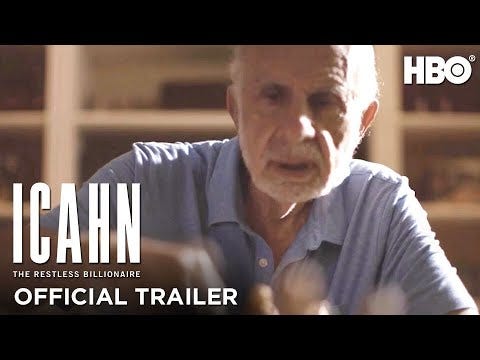Carl Icahn and the question of education
The Problem of Formulating an Adequate Explication of the Empiricist Creation of Meaning is the title of a paper written by Carl Icahn in his senior year at Princeton University, in 1957. But don’t ask him what that title means—he doesn’t know, as he explained recently in a documentary about his life.
The famous corporate raider, worth an estimated $20 billion, is filmed holding a copy of the paper. He reads the title for the camera, and reflects that he doesn’t have the first clue what that title means or what the paper is about. He studied philosophy in college, and went on to earn billions on Wall St.
Carl Icahn is no doubt a very smart guy, but I think there’s a lesson we can learn from this short scene in an otherwise unremarkable hagiography about his life: his formal education is largely meaningless to him. But let's not overstate the argument: Icahn probably would not have been able to do what he has done had he not had any formal education.
I don’t think that the appropriate conclusion here is that formal education has no value. But it doesn’t determine outcomes. Lots of people who were similarly educated have not had Carl Icahn’s success.
So what can we say about formal education, then? It clearly did not cause his success. The relative lack of success of other people, similarly educated, suggests that the connection between his education and his success is tenuous.
My best guess is this: Carl Icahn has a certain base level of intelligence, which he was able to cultivate by gaining admission to Princeton University, and which culminated in his writing a thesis, the contents of which, decades later, mean nothing to him. But for reasons having little to do with formal education, he was able to focus that innate intelligence on economically productive activities. In his case, he picked corporate raiding, and was lucky enough to be operating at a time when it proved to be very remunerative.
What I am left with is this observation: education, by itself, does little to determine life outcomes. Education can enhance one’s innate intelligence, but education by itself does not confer success. Hard work, perseverance, people skills: all those matter much more than does whatever Icahn learned in class. And this is a tough lesson for academics, for parents, and for anyone else whose view of education is that education is the thing that causes success. Outside of a few limited professional endeavors, such as the academy and perhaps law and medicine, formal education really has little bearing on the level of success you achieve.
Formal education can expose you to successful professional people whose habits and mannerisms you can learn to emulate. Formal education can train you to sit at a desk for hours at a time, puzzling over abstract concepts. Formal education can socialize you. But formal education by itself appears to do relatively little.
Startups, distribution, and community: if you don’t have a product, none of it matters
Kevin Kelly came up with the notion of 1,000 True Fans. The idea is this: if you can get 1,000 people to buy whatever you’re building, your company will be a success. I don’t think it’s that simple, but it’s an interesting rubric to consider:
The mathematics of 1,000 true fans is not a binary choice. You don’t have to go this route to the exclusion of another. Many creators, including myself, will use direct relations with super fans in addition to mainstream intermediaries. I have been published by several big-time New York publishers. I have self-published. And I have used Kickstarter to publish to my true fans. I chose each format depending on the content and my aim. But in every case, cultivating my true fans enriches the route I choose.
The takeaway: 1,000 true fans is an alternative path to success other than stardom. Instead of trying to reach the narrow and unlikely peaks of platinum bestseller hits, blockbusters, and celebrity status, you can aim for direct connection with a thousand true fans. On your way, no matter how many fans you actually succeed in gaining, you’ll be surrounded not by faddish infatuation, but by genuine and true appreciation. It’s a much saner destiny to hope for. And you are much more likely to actually arrive there.
The context here is that internet technology has allowed digital creators to build income streams where it was previously impossible. And this is true! Lots of people make a living via YouTube, TikTok, Instagram, OnlyFans, etc. And that’s great: distribution is what drives revenue.
This is true for literally any company: Coca-Cola’s revenue is partially a function of the amount of syrup that its bottlers buy from it; its bottlers’ revenue is a function of the amount of bottles of Coca-Cola wholesalers, etc., buy from them, and so on down the line to the end consumer.
Distribution matters. A lot.
The problem arises, though, when people put the distribution cart before the product horse. If you’re running a startup and you start to build a community of ‘1,000 true fans’ before you have a usable product, you’re basically building hype. And hype has a nasty habit of disappearing just when you need it the most.
So if you’re running a startup, the play should be something like the following:
Talk to a few prospective early users or customers.
Build version 1.0 of your product based on feedback you’ve received.
Build a community of interested people so that you have a distribution channel.
Incorporate your community’s feedback into version 2.0.
And that’s it. Before you can rely on your 1,000 True Fans for distribution: you need a working, usable product. Build the product before you build the community.


